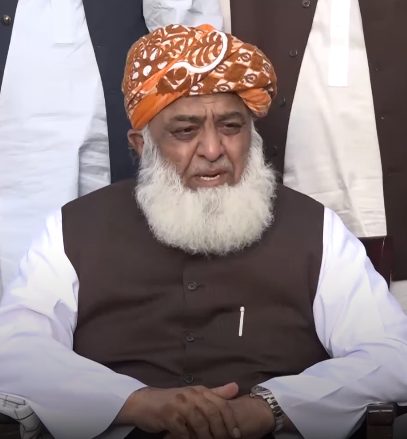JUI-F leader Maulana Fazlur Rehman claims Pakistan is suffering economically as it becomes a central arena in the evolving global cold war, with failed attempts to secure Chinese investment
In a stark declaration, Maulana Fazlur Rehman, the leader of the Jamiat Ulema-i-Islam-Fazl (JUI-F), has criticized Pakistan’s current economic plight and geopolitical positioning, describing the country as a battleground in a new cold war. Addressing a traders’ convention in Peshawar on Sunday, Rehman highlighted Pakistan’s deteriorating economic situation and its struggle to attract foreign investment amidst growing global tensions.
Rehman drew parallels between Pakistan’s current situation and Afghanistan’s role during the Cold War era when it was a focal point of the conflict between the United States and the Soviet Union. He argued that while Afghanistan was once the battleground for superpower rivalry, Pakistan is now enduring the effects of a similar geopolitical struggle, intensified by the rising influence of China. Rehman emphasized that Pakistan’s economic difficulties are exacerbated by this global power struggle.
Embed from Getty ImagesThe JUI-F chief expressed frustration over recent diplomatic failures, specifically the lack of progress from a recent visit by Pakistan’s Prime Minister and Chief of Army Staff to China. According to Rehman, the Chinese government refused to make new investments in Pakistan, citing the country’s political instability and unreliable security situation. This failure, he suggested, highlights the broader issues plaguing Pakistan’s economic environment.
Rehman also criticized Pakistan’s current parliamentary system, arguing that it lacks public trust and legitimacy. He drew historical comparisons to the British colonial era, noting that the locals then were hesitant to pay taxes, believing they would only perpetuate colonial rule rather than benefit their welfare. He lamented that 77 years after Pakistan’s independence, the situation remains similar, with citizens skeptical about the use of tax revenues, which they fear are being used to service debts rather than improve public welfare.
The JUI-F leader advocated for significant reforms to rebuild public trust and improve economic conditions. He criticized the practice of appointing finance ministers from outside the country and the government’s policies towards farmers and businesses. Rehman noted that while taxes are imposed on farmers, they receive no incentives, and the importation of wheat during the local harvest season undermines local agriculture.
He also highlighted the deplorable state of law and order in Pakistan, where traders are reportedly subjected to extortion and police stations in several districts are closed after hours, leaving areas under the control of armed groups. This deteriorating security situation, he argued, hampers business growth and economic development.
In his address, Rehman pledged to resist any attempts to alter the country’s constitutional and religious identity, asserting that only politicians who understand the needs of the people and the country can navigate Pakistan out of its current crises.
Other speakers at the convention included Maulana Attaur Rehman, JUI-F provincial chief, Sarhad Chamber of Commerce and Industry (SCCI) president Faud Ishaq, former governor Haji Ghaulam Ali, and prominent trader leaders such as Ilyas Bilour.
Analysis:
Political Perspective: Maulana Fazlur Rehman’s remarks underscore the growing concerns about Pakistan’s role in the shifting global geopolitical landscape. His criticism of the current administration’s foreign policy, particularly its failed attempts to secure Chinese investment, reflects broader anxieties about Pakistan’s political stability and its ability to leverage international partnerships effectively. Rehman’s call for political reforms and increased public trust highlights the need for a more stable and accountable government to address both domestic and international challenges.
Social Perspective: Rehman’s address resonates with widespread public frustration over economic mismanagement and governance issues in Pakistan. The comparison to colonial times and the criticism of tax use reflect deep-seated discontent with the current political and economic systems. The emphasis on rebuilding trust and improving welfare suggests a broader demand for more effective and transparent governance that directly benefits the populace.
Racial Perspective: While Rehman’s speech does not directly address racial issues, the broader implications of economic and political instability can disproportionately affect marginalized communities. The struggle for economic growth and security in Pakistan can exacerbate existing inequalities, highlighting the need for inclusive policies that address the needs of all citizens.
Gender Perspective: The gender dynamics in Pakistan’s political and economic landscape are not directly addressed in Rehman’s speech. However, the call for reforms and better governance has implications for gender equity, as more inclusive and effective policies could benefit women and marginalized groups by improving overall economic conditions and reducing systemic inequalities.
Economic Perspective: The economic implications of Rehman’s critique are significant. The failure to attract foreign investment, combined with poor governance and law enforcement, creates a challenging environment for economic growth. Rehman’s call for reform, including better management of tax revenues and support for businesses, reflects the urgent need for policies that can stimulate economic development and address the structural issues facing Pakistan’s economy.
